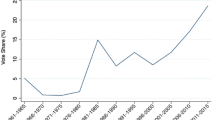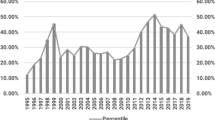Abstract
We expose the way the market evaluates internal political risk and instability in democratic polities by analysing the determinants of sovereign spreads of EU member states over the course of the past two decades. Our analysis builds on the “democratic advantage” argument which suggests democracies enjoy preferential treatment on the international market of sovereign debt because of their better ability to make credible commitments. We suggest that, when it comes to the market’s evaluation of internal political instability and risk in democratic polities, there actually exists a “consolidated democracy advantage”. In times of political instability, older and more consolidated democracies pay less of a premium on their debt than their younger and less consolidated counterparts. In other words, the market indeed views the commitment of consolidated democracies with long track records of democratic competition and survival as something qualitatively different than the commitment of new democracies with short track records.







Similar content being viewed by others
Notes
The only EU member states missing are Cyprus and Estonia which did not have outstanding long-term debt securities with a residual maturity of close to ten years during the period covered. (Eurostat 2018).
We also tested whether the data are stationary using the Im–Pesaran–Shin unit-root test (for unbalanced data). The null hypothesis in the test was rejected, indicating that the data do not contain a unit root (p < 0.001) and our findings are not driven by spurious correlation.
References
Acemoglu, D., and J.A. Robinson. 2005. Economic origins of dictatorship and democracy. Cambridge: Cambridge University Press.
Akitoby, B., and T. Stratmann. 2006. Fiscal policy and financial markets. IMF Working Paper WP/06/16.
Archer, C.C., G. Biglaiser, and K. DeRouen. 2007. Sovereign bonds and the “democratic advantage”: Does regime type affect credit rating agency ratings in the developing world? International Organization 61(2): 341–365.
Armingeon, K., L. Knöpfel, D. Weisstanner, and S. Engler. 2014. Comparative political data set III 1990–2012. Bern: Institute of Political Science, University of Bern.
Attinasi, M., C. Checherita, and C. Nickel. 2009. What explains the surge in euro area sovereign spreads during the financial crisis of 2007–09? In European Central Bank Working Paper 1131.
Baldacci, E., S. Gupta, and A. Mati. 2008 Is it (still) mostly fiscal? Determinants of sovereign spreads in emerging markets. IMF Working Paper WP/08/259.
Balkan, E. 1992. Political instability, country risk and probability of default. Applied Economics 24: 999–1008.
Barta, Z., and A. Johnston. 2018. Rating politics? Partisan discrimination in credit ratings in developed economies. Comparative Political Studies 51(5): 587–620.
Bawn, K., and F. Rosenbluth. 2006. Short versus long coalitions: Electoral accountability and the size of the public sector. American Journal of Political Science 50(2): 251–265.
Beaulieu, E., G.W. Cox, and S. Saiegh. 2012. Sovereign debt and regime type: Reconsidering the democratic advantage. International Organization 66(4): 709–738.
Bechtel, M.M. 2009. The political sources of systematic investment risk: Lessons from a consensus democracy. Journal of Politics 71: 661–677.
Bekaert, G., C.R. Harvey, C.T. Lundblad, and S. Siegel. 2016. Political risk and international valuation. Journal of Corporate Finance 37: 1–23.
Bell, A., and K. Jones. 2015. Explaining fixed effects: Random effects modelling of time-series cross-sectional and panel data. Political Science Research and Methods 3(1): 133–153.
Bernhard, W., and D. Leblang. 2002. Democratic processes, political risk, and foreign exchange markets. American Journal of Political Science 46(2): 316–333.
Bernoth,K., J. von Hagen, and L. Schuknecht. 2004 Sovereign risk premia in the European government bond market. European Central Bank Working Paper 369.
Biglaiser, G., B. Hicks, and C. Huggins. 2008. Sovereign bond ratings and the democratic advantage: Portfolio investment in the developing world. Comparative Political Studies 41: 1092–1116.
Block, S.A., and P.M. Vaaler. 2004. The price of democracy: Sovereign risk ratings, bond spreads and political business cycles in developing countries. Journal of International Money and Finance 23(6): 917–946.
Boix, C. 2000. Partisan governments, the international economy, and macroeconomic policies in advanced nations, 1960–93. World Politics 53: 38–73.
Breen, M., and I. McMenamin. 2013. Political institutions, credible commitment, and sovereign debt in advanced economies. International Studies Quarterly 57: 842–854.
Brooks, S., R. Cunha, and L. Mosley. 2015. Categories, creditworthiness, and contagion: How investors’ shortcuts affect sovereign debt markets. International Studies Quarterly 59(3): 587–601.
Bussiere, M., and C. Mulder. 2000. Political instability and economic vulnerability. International Journal of Finance and Economics 5(4): 309–330.
Cuadra, G., and H. Sapriza. 2008. Sovereign default, interest rates and political uncertainty in emerging markets. Journal of International Economics 76: 78–88.
De Haan, J., J.E. Sturm, and G. Beekhuis. 1999. The weak government thesis: Some new evidence. Public Choice 101(3–4): 163–176.
Edwards, S. 1984. LDC foreign borrowing and default risk: An empirical investigation 1976–80. American Economic Review 74: 726–734.
Eichler, S. 2014. The political determinants of sovereign bond yield spreads. Journal of International Money and Finance 46(C): 82–103.
Eichler, S., and T. Plaga. 2017. The economic performance of the government and the resolution of uncertainty in sovereign bond markets around national elections. Working Paper.
Elgie, R., and I. McMenamin. 2008. Political fragmentation, fiscal deficits and political institutionalisation. Public Choice 136: 255–267.
Eurostat. 2018. Available at ec.europa.eu/eurostat/data/database.
Fowler, J.H. 2006. Elections and markets: The effect of partisanship, policy risk, and electoral margins on the economy. Journal of Politics 68(1): 89–103.
Glaurdić, J., and V. Vuković. 2017. Granting votes: Exposing the political bias of intergovernmental grants using the within-between specification for panel data. Public Choice 171(1–2): 223–241.
Gray, J. 2013. The company states keep: International economic organizations and investor perceptions. Cambridge, UK: Cambridge University Press.
Hallerberg, M., and G. Wolff. 2008. Fiscal institutions, fiscal policy and sovereign risk premia in EMU. Public Choice 136: 279–396.
Haque, N.U., M. Nelson, and D.J. Mathieson. 1998. The relative importance of political and economic variables in creditworthiness ratings. IMF Working Paper WP/98/46.
Hauner, D., J. Jonas, and M. Singh Kumar. 2010. Sovereign risk: Are the EU’s new member states different? Oxford Bulletin of Economics and Statistics 72(4): 411–427.
Hayek, F. 1960. The constitution of liberty. Chicago: University of Chicago Press.
Huntington, S. 1968. Political order in changing societies. New Haven: Yale University Press.
IMF. 2018. International financial statistics. Available at: http://data.imf.org/.
Kohlscheen, E. 2010. Sovereign risk: Constitutions rule. Oxford Economic Papers 62: 62–85.
Leblang, D., and B. Mukherjee. 2005. Government partisanship, elections, and the stock market: Examining American and British stock returns, 1930–2000. American Journal of Political Science 49: 780–802.
Linz, J., and A. Stepan. 1996. Toward consolidated democracies. Journal of Democracy 7(2): 14–33.
Malgouyres, C., and C. Mazet-Sonilhac. 2018. Political uncertainty, risk of Frexit and European sovereign spreads. Applied Economics Letters 25(14): 1004–1009.
Manasse, P., N. Roubini, and A. Schimmelpfennig. 2003. Predicting sovereign debt crisis. IMF Working Paper WP/03/221.
Marshall, M.G., T.R. Gurr, and K. Jaggers. 2018. Polity IV project: Political regime characteristics and transitions, 1800–2016. Available at www.systemicpeace.org/inscrdata.html.
Moser, C. 2007. The impact of political risk on sovereign bond spreads—evidence from Latin America. Proceedings of the German Development Economics Conference, Göttingen 2007. Verein für Sozialpolitik, Research Committee Development Economics, No. 24.
Moser, C., and A. Dreher. 2010. Do markets care about central bank governor changes? Journal of Money, Credit and Banking 42(8): 1589–1612.
Mundlak, Y. 1978. On the pooling of time series and cross section data. Econometrica 46(1): 69–85.
Nickel, C., P. Rother, and J.-C. Ruelke. 2011. Fiscal variables and bond spreads—Evidence from Eastern European countries and Turkey. Applied Financial Economics 21(17): 1291–1307.
North, D.C., and B.R. Weingast. 1989. Constitutions and commitment: The evolution of institutions governing public choice in seventeenth-century England. Journal of Economic History 49(4): 803–832.
Pantzalis, C., D. Stangeland, and H. Turtle. 2000. Political elections and the resolution of uncertainty: The international evidence. Journal of Banking & Finance 24: 1575–1604.
Qian, R. 2010. Why do some countries default more often than others? The role of institutions. Working paper.
Rommerskirchen, C. 2015. Fiscal rules, fiscal outcomes and financial market behavior. European Journal of Political Research 54: 836–847.
Saiegh, S.M. 2005. Do countries have a “democratic advantage”? Political institutions, multilateral agencies, and sovereign borrowing. Comparative Political Studies 38(4): 366–387.
Sattler, T. 2013. Do markets punish left governments? Journal of Politics 75(2): 343–356.
Savona, R., and M. Vezzoli. 2015. Fitting and forecasting sovereign defaults using multiple risk signals. Oxford Bulletin of Economics and Statistics 77(1): 66–92.
Schmidt, M.G. 1992. Regierungen: Parteipolitische Zusammensetzung. In Lexikon der Politik, Band 3. Die westlichen Länder, ed. Schmidt, M.G. 393–400. München: C.H. Beck.
Schmidt, M.G. 1996. When parties matter: A review of the possibilities and limits of partisan influence on public policy. European Journal of Political Research 30: 155–183.
Schuknecht, L., J. von Hagen, and G. Wolswijk. 2009. Government risk premiums in the bond market: EMU and Canada. European Journal of Political Economy 25: 371–384.
Schultz, K., and B. Weingast. 2003. The democratic advantage. International Organization 57(1): 3–42.
Smaoui, H., N. Boubakri, and J.-C. Cosset. 2017. The politics of sovereign credit spreads. Emerging Markets Finance and Trade 53(8): 1894–1922.
Svolik, M. 2008. Authoritarian reversals and democratic consolidation. American Political Science Review 102(2): 153–168.
Tomz, M. 2007. Reputation and international cooperation: Sovereign debt across three centuries. Princeton: Princeton University Press.
Vaaler, P.M., B.N. Schrage, and S.A. Block. 2005. Counting the investor vote: Political business cycle effects on sovereign bond spreads in developing countries. Journal of International Business Studies 36: 62–88.
Vaaler, P.M., B.N. Schrage, and S.A. Block. 2006. Elections, opportunism, partisanship and sovereign ratings in developing countries. Review of Development Economics 10(1): 154–170.
Van Rijckeghem, C., and B. Weder. 2009. Political institutions and debt crises. Public Choice 138(3/4): 387–408.
Volkerink, B., and J. de Haan. 2001. Fragmented government effects on fiscal policy: New evidence. Public Choice 109(3–4): 221–242.
Yue, V.Z. 2010. Sovereign default and debt renegotiation. Journal of International Economics 80: 176–187.
Acknowledgements
This work was supported by the Croatian Science Foundation (HZZ) under the project 1356: “Economic, statistical and political aspects of sovereign bond markets”.
Author information
Authors and Affiliations
Corresponding author
Additional information
Publisher's Note
Springer Nature remains neutral with regard to jurisdictional claims in published maps and institutional affiliations.
Electronic supplementary material
Below is the link to the electronic supplementary material.
Rights and permissions
About this article
Cite this article
Glaurdić, J., Lesschaeve, C. & Vizek, M. Consolidated democracy advantage: political instability and sovereign spreads in the EU. Comp Eur Polit 18, 437–459 (2020). https://doi.org/10.1057/s41295-019-00193-2
Published:
Issue Date:
DOI: https://doi.org/10.1057/s41295-019-00193-2




